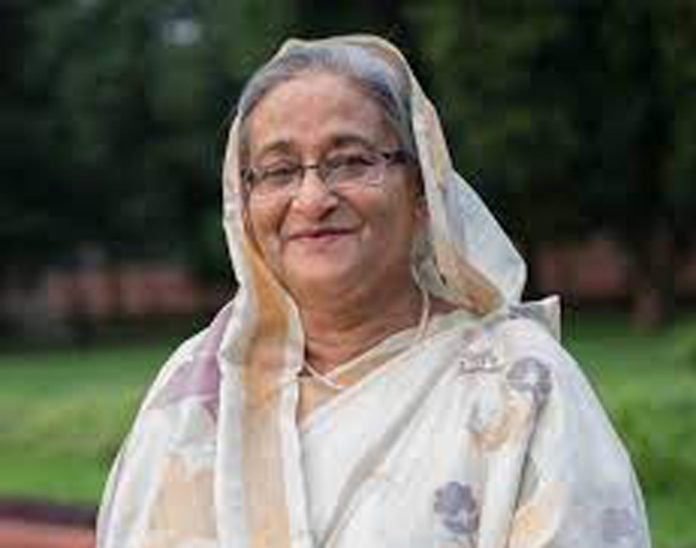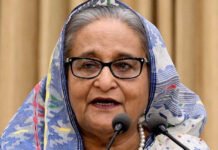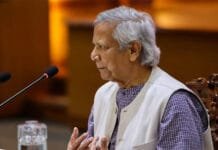Read the Sheikh Hasina’s final, unheard speech before her exile, where she details her decision to resign, the foreign influences at play, and her unwavering commitment to Bangladesh’s sovereignty .
In the tumultuous aftermath of the coup in Bangladesh, the nation has witnessed an upheaval that has shaken its political foundation. One week ago, Sheikh Hasina, the former Prime Minister, was forced into exile, marking a dramatic end to her tenure. Now, her last, unheard speech has surfaced—a message laden with the weight of sacrifice, duty, and a deep commitment to the people of Bangladesh.
Sheikh Hasina’s Farewell: A Moment of Resignation
Sheikh Hasina, before vacating her official residence in Dhaka, had prepared a speech to address the nation. This speech was never delivered, as events unfolded rapidly, pushing her into exile. However, the content of her message has now come to light, offering insight into her decision to step down from power.
In her speech, Sheikh Hasina stated, “I resigned so that I don’t have to see the procession of dead bodies.” These words reflect the gravity of the situation in Bangladesh at the time. Protests, which initially started over the issue of reservation, quickly escalated into a full-blown confrontation with her government. With the violence intensifying, the streets of Dhaka became a battlefield, and the threat of further bloodshed loomed large.
The Unseen Forces Behind the Coup
Sheikh Hasina did not mince words when she accused foreign powers of being involved in the destabilization of her government. She specifically pointed fingers at the United States, alleging that it played a crucial role in orchestrating the change of power. She claimed that the U.S. sought to undermine Bangladesh’s sovereignty by demanding the surrender of St. Martin Island and establishing dominance in the Bay of Bengal.
In her address, she emphasized, “I could have remained in power if I had surrendered the sovereignty of St. Martin Island to the U.S. and allowed it to establish its dominance in the Bay of Bengal.” This statement underscores the difficult choices she faced as a leader. Choosing between maintaining power and protecting her nation’s sovereignty, Sheikh Hasina opted for the latter, knowing the immense cost it would entail.
The Human Cost of Power: A Leader’s Dilemma
The movement against Sheikh Hasina’s government saw hundreds of protesters losing their lives. Despite her best efforts to quell the violence, the situation spiraled out of control. Her decision to resign was not one made out of weakness, but rather out of a desire to prevent further loss of life and destruction of the nation’s resources.
Sheikh Hasina’s words resonate with a deep sense of responsibility: “If I had stayed in the country, more lives would have been lost, more resources would have been destroyed. I took an extremely difficult decision to exit.” In choosing to step down, she aimed to protect her people from further suffering, even if it meant relinquishing the position she had held with steadfast determination.
A Call to the Nation: Unity in the Face of Adversity
In her speech, Sheikh Hasina made an emotional appeal to the people of Bangladesh, urging them not to be misled by fundamentalists or foreign interests. She called for unity and resilience, reminding the nation of the sacrifices made by her family and the Awami League in the pursuit of Bangladesh’s independence and prosperity.
“I am your leader because you chose me; you were my strength,” she declared. Her words serve as a reminder that the true power in any democracy lies with the people. Despite the turbulent circumstances, she expressed confidence in the enduring spirit of the Awami League and the people of Bangladesh.
The Aftermath: A Nation in Turmoil
The departure of Sheikh Hasina from Bangladesh has left a void that has been filled with uncertainty and chaos. Reports have emerged of violence and retribution, with activists being targeted, homes set ablaze, and leaders silenced. In her message, Sheikh Hasina acknowledged the challenges that lie ahead, but she also offered a message of hope.
“Do not lose courage. The Awami League has stood up again and again. You made it. Don’t be disheartened. I will return soon. Insha Allah.” These words were meant to bolster the spirits of her supporters, encouraging them to remain steadfast in the face of adversity.
The Legacy of Sheikh Hasina: A Chapter Unfinished
Sheikh Hasina’s resignation and exile mark a significant chapter in Bangladesh’s history. Her leadership has been characterized by both triumphs and controversies, but her commitment to the nation’s sovereignty and her people cannot be denied. The political landscape of Bangladesh is now at a crossroads, with the future uncertain and the path ahead fraught with challenges.
Yet, even in exile, Sheikh Hasina’s influence endures. Her promise to return, coupled with her unwavering faith in the resilience of the Bangladeshi people, suggests that her story is far from over. The legacy of her leadership will continue to shape the nation’s political discourse, as Bangladesh navigates its way through this period of turmoil.
Conclusion: The End of an Era, or a New Beginning?
As Bangladesh moves forward, the final words of Sheikh Hasina will remain a poignant reminder of the sacrifices made in the name of leadership and the pursuit of national integrity. Whether her departure marks the end of an era or the beginning of a new chapter in Bangladesh’s history remains to be seen. What is certain, however, is that Sheikh Hasina’s impact on the nation will be felt for years to come.
Her resignation may have been a necessary decision to prevent further bloodshed, but it has also left a nation grappling with the consequences. As the dust settles, the people of Bangladesh will have to decide whether to honor her legacy or chart a new course for their future.
In the words of Sheikh Hasina, “The defeat is mine, but the victory belongs to the people of Bangladesh.” This victory, however, will depend on the unity and strength of the nation in the face of its current challenges.
















